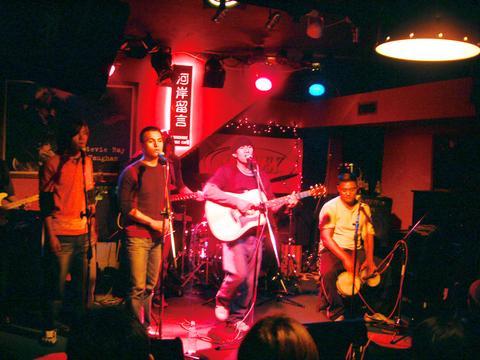One of the most engaging Aboriginal artists, if not the most famous, Biung is appearing tomorrow night at the Riverside Music Cafe.
Wang Hong-en (

PHOTO COURTESY OF RIVERSIDE MUSIC CAFE
More recently, Biung has channeled his fondness for writing about his ancestral heritage into a nightly television program highlighting the treatment of Aborigines during the Japanese occupation of Taiwan. The program airs nightly at 8pm on public television.
With homegrown lyrics that both emphasize his ethnic background and are a diary of his childhood experiences, most of his songs are written in the Bunun language. "Bunun is my mother tongue so when I am singing about my experiences it seems appropriate to sing in my native language."
At 28, Biung has already released two albums in addition to receiving a Golden Melody Award for Best Non-Mandarin Male Singer in 2002. His first album, The Hunter, was completed while he was still a college student and recorded entirely in his native language. In order to garner a larger audience, however, Biung decided to include songs in Mandarin on his second album, Biung.
What sets Biung apart from his Aboriginal contemporaries is his style, which marries traditional Bunun music with an upbeat pop-esque sound. While he denies that Taiwanese Mando-pop has had any large effect on his music, he does confess to listening to Western pop artists such as Michael Jackson and Linkin Park.
"I don't put any limitations on the kind of music I listen to, but musically the biggest inspiration to me has been traditional Bunun music.
Although the audience can't understand all of his lyrics, it doesn't stop crowds of people from packing in to see Biung perform live.
Geddy Lin (
Whether it's salvation from another night at a monster club in Taipei or simply to change things up, Biung provides a good introduction to one of Taiwan's unique Aboriginal sounds.
Performance notes:
Biung will perform tomorrow night at Riverside Music Cafe
Tickets cost NT$300.
For details call (02) 2368 7310.

The primaries for this year’s nine-in-one local elections in November began early in this election cycle, starting last autumn. The local press has been full of tales of intrigue, betrayal, infighting and drama going back to the summer of 2024. This is not widely covered in the English-language press, and the nine-in-one elections are not well understood. The nine-in-one elections refer to the nine levels of local governments that go to the ballot, from the neighborhood and village borough chief level on up to the city mayor and county commissioner level. The main focus is on the 22 special municipality

In the 2010s, the Communist Party of China (CCP) began cracking down on Christian churches. Media reports said at the time that various versions of Protestant Christianity were likely the fastest growing religions in the People’s Republic of China (PRC). The crackdown was part of a campaign that in turn was part of a larger movement to bring religion under party control. For the Protestant churches, “the government’s aim has been to force all churches into the state-controlled organization,” according to a 2023 article in Christianity Today. That piece was centered on Wang Yi (王怡), the fiery, charismatic pastor of the

Hsu Pu-liao (許不了) never lived to see the premiere of his most successful film, The Clown and the Swan (小丑與天鵝, 1985). The movie, which starred Hsu, the “Taiwanese Charlie Chaplin,” outgrossed Jackie Chan’s Heart of Dragon (龍的心), earning NT$9.2 million at the local box office. Forty years after its premiere, the film has become the Taiwan Film and Audiovisual Institute’s (TFAI) 100th restoration. “It is the only one of Hsu’s films whose original negative survived,” says director Kevin Chu (朱延平), one of Taiwan’s most commercially successful

The People’s Republic of China (PRC) invaded Vietnam in 1979, following a year of increasingly tense relations between the two states. Beijing viewed Vietnam’s close relations with Soviet Russia as a threat. One of the pretexts it used was the alleged mistreatment of the ethnic Chinese in Vietnam. Tension between the ethnic Chinese and governments in Vietnam had been ongoing for decades. The French used to play off the Vietnamese against the Chinese as a divide-and-rule strategy. The Saigon government in 1956 compelled all Vietnam-born Chinese to adopt Vietnamese citizenship. It also banned them from 11 trades they had previously